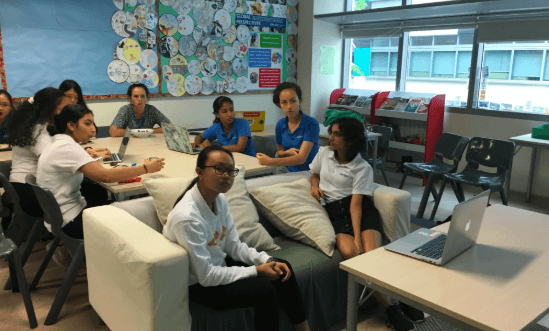Pranav Mohan is an alumni from UWCSEA East who is now studying at Oklahoma University in the United States. Mr Louis Barnett, a science teacher, has kept in contact with Pranav and passed Pranav’s contact details to our G.E.P teacher coordinator Ms Wilson, as Pranav has been working on a project that focuses on menstruation health in India.
It so happened that Pranav was friends with my brother as they were in the same graduating class here at East so I offered to contact him on behalf of G.E.P. Pranav was very generous in allowing us to Skype him during our lunchtime G.E.P meeting as it was the middle of the night in the US. The Skype session proved invaluable in terms of learning about the project that Pranav has been working on and to gain his advice on how our group can move forward.
Pranav has been working in a team of three with fellow university students on an initiative called Money Spent Right with funding through Project from the Davis Scholarship programme. Pranav and his team mates were awarded $10,000US for their project, which is a pretty wonderful way to kick start their work. The project that they set up raises awareness about menstrual practices in rural India. They hold seminars and presentations in both rural and urban communities about the use of menstrual cups and their benefits. They started off by raising awareness in Pranav’s hometown of Lucknow and then branched off to different villages and communities giving them the knowledge of menstrual cups, and also providing women in the community with cups.
The group decided to promote menstrual cups because researches showed them that they are more sustainable and cheaper to produce. For example, Pranav told us that menstrual cup can be used for up to 10 years if it’s still in good condition. Pads and tampons are extremely expensive in India so women in poverty choose to use just a plain cloth instead. By promoting the use of menstrual cups the group is also promoting hygiene for those women. Pranav did comment that initially some women were unsure about using the cups but very quickly they showed a willingness to try them and overall he and his teammates have been pleasantly surprised by the rate to which the women in the rural communities are using the cups. Going back into the communities and getting data on how much the cups are being used is an important second phase of the project.
Pranav’s advice for us is to advocate about these problems in our own community since he considers it to be somewhat inappropriate to try and impact communities outside Singapore due to language, culture and ethical reasons. These were interesting ideas for us as members of G.E.P to consider. Pranav is open to assist us in conducting seminars in local communities and schools.
It was really interesting to learn about the work that Pranav is doing and the way that his time spent working on service projects at UWCSEA East has made him want to impact communities in his home country of India on a wider scale as possible. The members of G.E.P think that it is particularly terrific to see a male take a leading role in empowering girls and women in issues related to menstrual health and hygiene.
As current UWCSEA students pursuing service there is so much that we can learn from our alumni and G.E.P hope to continue working with Pranav and to build up more alumni contacts in the future.
Written by Lydia Tang & Melanie Wilson

